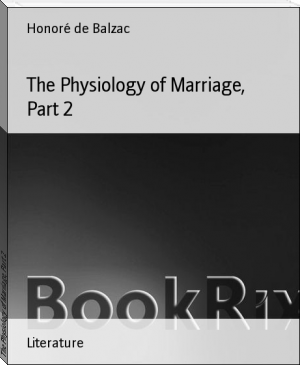The Physiology of Marriage, Part 1 - Honoré de Balzac (english novels to improve english .txt) 📗

- Author: Honoré de Balzac
Book online «The Physiology of Marriage, Part 1 - Honoré de Balzac (english novels to improve english .txt) 📗». Author Honoré de Balzac
"Alas!
Is it right to be heir of the man who we slay?"
Never has she seemed more anxious to please you. She will seek, as much as possible, to allay the secret wounds which she thinks about inflicting upon your married bliss, she will do so by those little attentions which induce you to believe in the eternity of her love; hence the proverb, "Happy as a fool." But in accordance with the character of women, they either despise their own husbands from the very fact that they find no difficulty in deceiving them; or they hate them when they find themselves circumvented by them; or they fall into a condition of indifference towards them, which is a thousand times worse than hatred. In this emergency, the first thing which may be diagnosed in a woman is a decided oddness of behavior. A woman loves to be saved from herself, to escape her conscience, but without the eagerness shown in this connection by wives who are thoroughly unhappy. She dresses herself with especial care, in order, she will tell you, to flatter your _amour-propre_ by drawing all eyes upon her in the midst of parties and public entertainments.
When she returns to the bosom of her stupid home you will see that, at times, she is gloomy and thoughtful, then suddenly laughing and gay as if beside herself; or assuming the serious expression of a German when he advances to the fight. Such varying moods always indicate the terrible doubt and hesitation to which we have already referred. There are women who read romances in order to feast upon the images of love cleverly depicted and always varied, of love crowned yet triumphant; or in order to familiarize themselves in thought with the perils of an intrigue.
She will profess the highest esteem for you, she will tell you that she loves you as a sister; and that such reasonable friendship is the only true, the only durable friendship, the only tie which it is the aim of marriage to establish between man and wife.
She will adroitly distinguish between the duties which are all she has to perform and the rights which she can demand to exercise.
She views with indifference, appreciated by you alone, all the details of married happiness. This sort of happiness, perhaps, has never been very agreeable to her and moreover it is always with her. She knows it well, she has analyzed it; and what slight but terrible evidence comes from these circumstances to prove to an intelligent husband that this frail creature argues and reasons, instead of being carried away on the tempest of passion.
LX. The more a man judges the less he loves.
And now will burst forth from her those pleasantries at which you will be the first to laugh and those reflections which will startle you by their profundity; now you will see sudden changes of mood and the caprices of a mind which hesitates. At times she will exhibit extreme tenderness, as if she repented of her thoughts and her projects; sometimes she will be sullen and at cross-purposes with you; in a word, she will fulfill the _varium et mutabile femina_ which we hitherto have had the folly to attribute to the feminine temperament. Diderot, in his desire to explain the mutations almost atmospheric in the behavior of women, has even gone so far as to make them the offspring of what he calls _la bete feroce_; but we never see these whims in a woman who is happy.
These symptoms, light as gossamer, resemble the clouds which scarcely break the azure surface of the sky and which they call flowers of the storm. But soon their colors take a deeper intensity.
In the midst of this solemn premeditation, which tends, as Madame de Stael says, to bring more poetry into life, some women, in whom virtuous mothers either from considerations of worldly advantage of duty or sentiment, or through sheer hypocrisy, have inculcated steadfast principles, take the overwhelming fancies by which they are assailed for suggestions of the devil; and you will see them therefore trotting regularly to mass, to midday offices, even to vespers. This false devotion exhibits itself, first of all in the shape of pretty books of devotion in a costly binding, by the aid of which these dear sinners attempt in vain to fulfill the duties imposed by religion, and long neglected for the pleasures of marriage.
Now here we will lay down a principle, and you must engrave it on your memory in letters of fire.
When a young woman suddenly takes up religious practices which she has before abandoned, this new order of life always conceals a motive highly significant, in view of her husband's happiness. In the case of at least seventy-nine women out of a hundred this return to God proves that they have been inconsistent, or that they intend to become so.
But a symptom more significant still and more decisive, and one that every husband should recognize under pain of being considered a fool, is this:
At the time when both of you are immersed in the illusive delights of the honeymoon, your wife, as one devoted to you, would constantly carry out your will. She was happy in the power of showing the ready will, which both of you mistook for love, and she would have liked for you to have asked her to walk on the edge of the roof, and immediately, nimble as a squirrel, she would have run over the tiles. In a word, she found an ineffable delight in sacrificing to you that _ego_ which made her a being distinct from yours. She had identified herself with your nature and was obedient to that vow of the heart, _Una caro_.
All this delightful promptness of an earlier day gradually faded away. Wounded to find her will counted as nothing, your wife will attempt, nevertheless, to reassert it by means of a system developed gradually, and from day to day, with increased energy.
This system is founded upon what we may call the dignity of the married woman. The first effect of this system is to mingle with your pleasures a certain reserve and a certain lukewarmness, of which you are the sole judge.
According to the greater or lesser violence of your sensual passion, you have perhaps discerned some of those twenty-two pleasures which in other times created in Greece twenty-two kinds of courtesans, devoted especially to these delicate branches of the same art. Ignorant and simple, curious and full of hope, your young wife may have taken some degrees in this science as rare as it is unknown, and which we especially commend to the attention of the future author of _Physiology of Pleasure_.
Lacking all these different kinds of pleasure, all these caprices of soul, all these arrows of love, you are reduced to the most common of love fashions, of that primitive and innocent wedding gait, the calm homage which the innocent Adam rendered to our common Mother and which doubtless suggested to the Serpent the idea of taking them in. But a symptom so complete is not frequent. Most married couples are too good Christians to follow the usages of pagan Greece, so we have ranged, among the last symptoms, the appearance in the calm nuptial couch of those shameless pleasures which spring generally from lawless passion. In their proper time and place we will treat more fully of this fascinating diagnostic; at this point, things are reduced to a listlessness and conjugal repugnance which you alone are in a condition to appreciate.
At the same time that she is ennobling by her dignity the objects of marriage, your wife will pretend that she ought to have her opinion and you yours. "In marrying," she will say, "a woman does not vow that she will abdicate the throne of reason. Are women then really slaves? Human laws can fetter the body; but the mind!--ah! God has placed it so near Himself that no human hand can touch it."
These ideas necessarily proceed either from the too liberal teachings which you have allowed her to receive, or from some reflections which you have permitted her to make. A whole Meditation has been devoted to _Home Instruction_.
Then your wife begins to say, "_My_ chamber, _my_ bed, _my_ apartment." To many of your questions she will reply, "But, my dear, this is no business of yours!" Or: "Men have their part in the direction of the house, and women have theirs." Or, laughing at men who meddle in household affairs, she will affirm that "men do not understand some things."
The number of things which you do not understand increases day by day.
One fine morning, you will see in your little church two altars, where before you never worshiped but at one. The altar of your wife and your own altar have become distinct, and this distinction will go on increasing, always in accordance with the system founded upon the dignity of woman.
Then the following ideas will appear, and they will be inculcated in you whether you like it or not, by means of a living force very ancient in origin and little known. Steam-power, horse-power, man-power, and water-power are good inventions, but nature has provided women with a moral power, in comparison with which all other powers are nothing; we may call it _rattle-power_. This force consists in a continuance of the same sound, in an exact repetition of the same words, in a reversion, over and over again, to the same ideas, and this so unvaried, that from hearing them over and over again you will admit them, in order to be delivered from the discussion. Thus the power of the rattle will prove to you:
That you are very fortunate to have such an excellent wife;
That she has done you too much honor in marrying you;
That women often see clearer than men;
That you ought to take the advice of your wife in everything, and almost always ought to follow it;
That you ought to respect the mother of your children, to honor her and have confidence in her;
That the best way to escape being deceived, is to rely upon a wife's refinement, for according to certain old ideas which we have had the weakness to give credit, it is impossible for a man to prevent his wife from minotaurizing him;
That a lawful wife is a man's best friend;
That a woman is mistress in her own house and queen in her drawing-room, etc.
Those who wish to oppose a firm resistance to a woman's conquest, effected by means of her dignity over man's power, fall into the category of the predestined.
At first, quarrels arise which in the eye of wives give an air of tyranny to husbands. The tyranny of a husband is always a terrible excuse for inconsistency in a wife. Then, in their frivolous discussions they are enabled to prove to their families and to ours, to everybody and to ourselves, that we are in the wrong. If, for the sake of peace, or from love, you acknowledge the pretended rights





Comments (0)